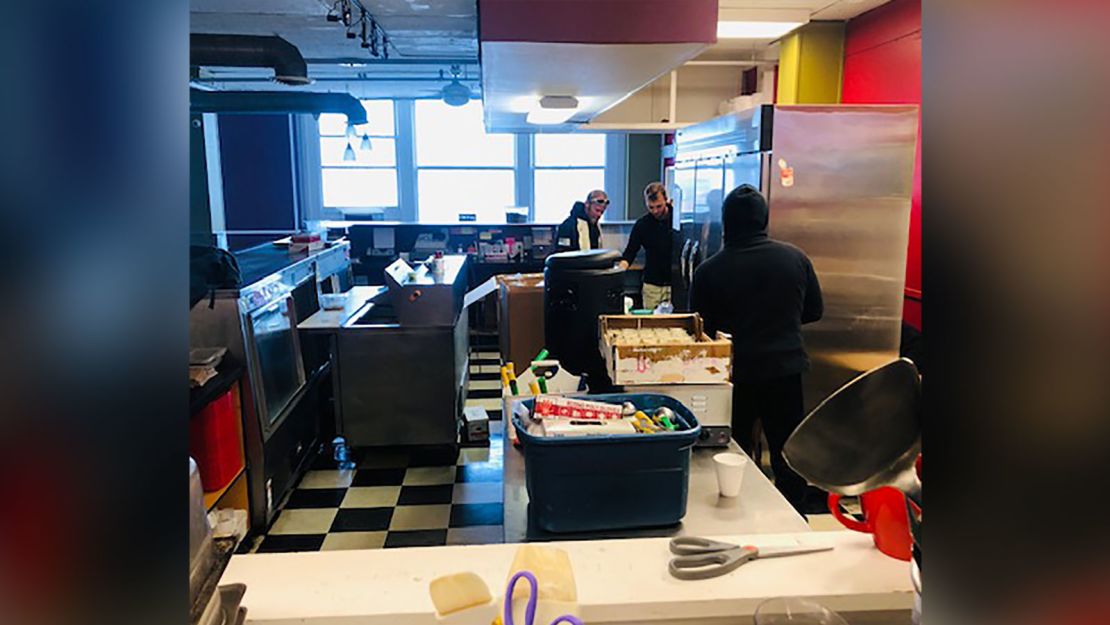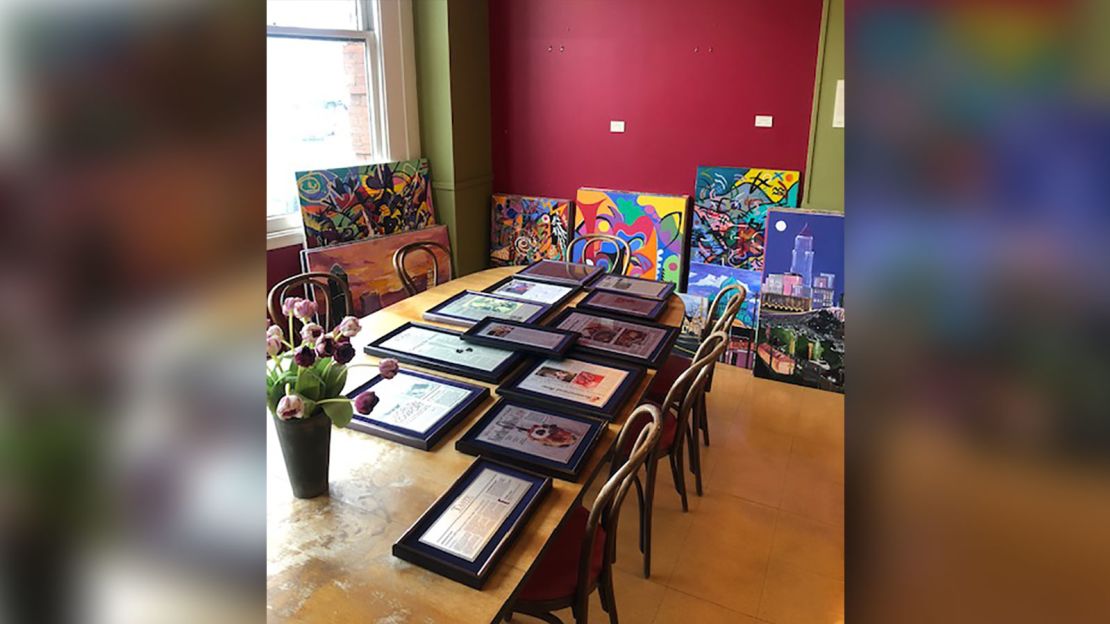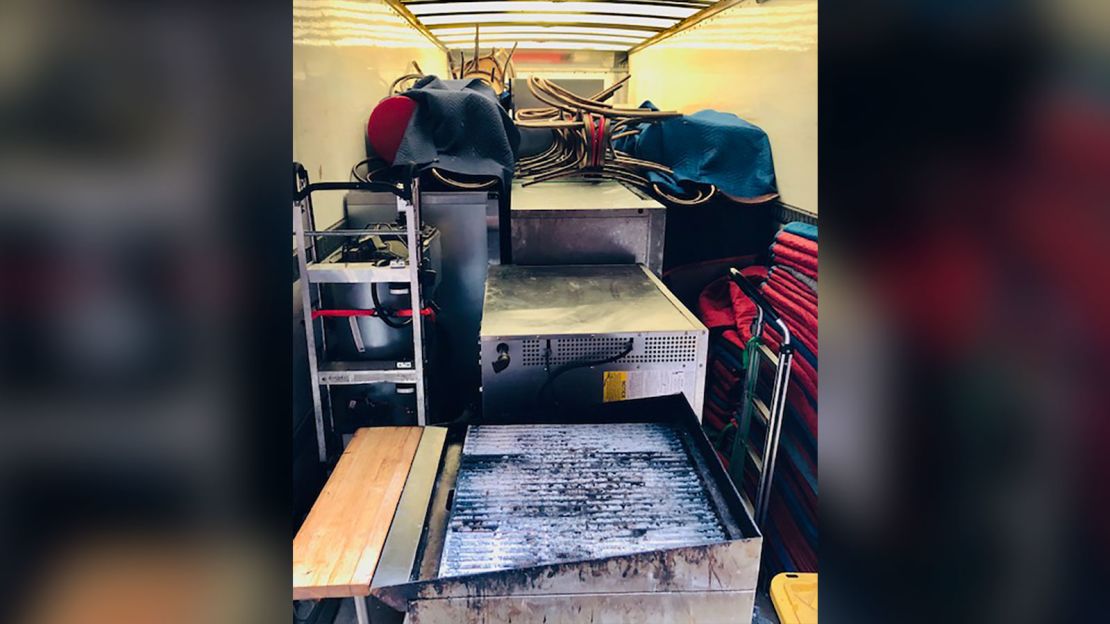Editor’s Note: Bridget McGinty is the former chef and owner of Tastebuds, a landmark restaurant in Cleveland, Ohio, for 19 years. She has moved to Ireland with her young son, where she plans to write and reflect on her experience. The opinions expressed in this commentary are her own; view more opinion on CNN.
It took two days and 10 to 12 men to remove every trace of Tastebuds, the restaurant in Cleveland, Ohio, that I built from the ground up 19 years ago. I had to remind myself to breathe when the grief would take hold of my lungs. With hospitals filling up with victims of the coronavirus, this was no time for a panic attack or worse.
My restaurant was one of the first to close at the start of this pandemic. Our final act was our finest hour. With a rise in Covid-19 cases prompting a second wave of restrictions and stay at home orders, many more restaurants will be forced to close. Leaving a legacy can lead to serenity.

In mid-April, two weeks before the moving trucks arrived, my sister and business partner Erin and I were only beginning to grasp our dire situation. We had been temporarily closed for a month, and had gone to work figuring out how we were going to reopen while waiting for the virus to miraculously disappear, as President Donald Trump assured us it would.
I worked on scaling down our menu, offering just a few items for take-out only, that I could prepare myself, because we could not afford to pay any staff. Erin began researching options that made us cringe in the past, like online ordering and delivery services. We never wanted to be an automated restaurant for anonymous customers.
Seeing our regulars is what got us out of bed every day, or the absolute joy of welcoming new customers and hearing that they will be back. I came up with the idea for Tastebuds because being a professional chef was lonely, the hours made me miserable, and I had taken all of the bullying and sexual harassment, something unfortunately very prevalent in this business, I could stand.

I set out to prove that you could lead a kitchen with love and kindness and still be successful. Happiness was the ultimate goal and it drove every decision, including being open just three hours a day, five days a week serving lunch only.
At the urging of our bank and fellow restaurateurs we applied for a Paycheck Protection Program loan the first week of April for $20,000. Erin and I tried desperately to ignore how the forgiveness part of the loan, which was contingent on hiring back employees by June 30, seemed doomed or possibly even designed to fail – but we were running out of options and money.
By then, my employees were making an extra $600 a week in unemployment benefits. They would lose money by returning to work, so I planned to use the loan to keep the rent paid, the utilities working and our monthly service commitments honored, like pest control, waste management, phones, insurance, and accounting, as long as I could. To open would take much, much more funding.
In the days that followed, information came from health experts, politicians and the media like jabs out of nowhere, leaving us dazed and confused. Restaurants would be slow to open and would have to limit capacity and practice social distancing. Our entire business model was in jeopardy. My passion was to offer a healthy alternative to the fast food so many of us are forced to eat on our lunch break, while making it just as efficient and economical. Profiting on that passion took massive volume.
As we waited and tried to remain positive, we learned that the PPP funds had dried up, drained by corporations with millions of dollars in reserve and chain restaurants. It seemed our rescue boat quickly filled with people who had their own life boats, and people like me, who were treading water, were simply left to drown. I felt betrayed by my bank, and I felt abandoned by my government.

The White House announced the “Great American Economic Revival Industry Groups,” which consisted of elite chefs with fine dining restaurants and restaurant executives of billion dollar chains. The group tasked with saving our industry was void of women and minorities, leaving small independent restaurateurs and workers feeling marginalized, many of whom took to social media, and we, as an industry, lost our unified front. Another family divided, by a president unwilling to confront the realities of the pandemic.
Days later, Ohio Gov. Mike DeWine closed schools for the rest of the year and Erin and I were sent scrambling to find care for our children and a way to pay for it once we reopen. With daycares heavily restricted and only providing care for workers at essential businesses, it seemed our only option was for Erin to step away, stay home with the children and for me to go it alone at Tastebuds.
Attending to a personal matter, I made a call to my parish priest. He asked me how I was doing, and of course, I told him the truth. It was the first time I could stop pretending I was ok. I didn’t have to be brave or strong for him. Father Mark wasn’t a business partner, or employee or customer. He listened, and I could hear his heart breaking. He said he would pray for us.
Later that day, he sent a text saying that if we have to liquidate, please consider St. Michael Archangel Church as a potential buyer. He explained that they had applied for grant money to renovate a hall and commercial kitchen to better serve the community.
The clock was ticking, the end of the month was approaching and I called my landlord to explain our inability to pay rent.
He was willing to work with us, however he made it very clear that rent was not being forgiven, it was being delayed. I explained that with no income for several months, we would never be able to catch up on the rent. He suggested we sell.
While we had some interest from potential buyers, Erin and I agreed the we could not sell Tastebuds in good faith. I felt strongly that I would be selling my dream for pennies on the dollar, and even still, it’s unlikely the new owner would be successful even with that great of a deal.
Succumbing to the shocking reality that Tastebuds, a landmark restaurant in Cleveland for 19 years was not going to make it, we decided to see what equipment St. Michael’s might want to buy.
We met Father Mark at the parish hall for a tour of their kitchen, which was badly in need of renovation. He introduced us to Randy and Mary Ann Balog, the energetic and happy couple who have run the food pantry for over 36 years.
Mary Ann explained that, by partnering with the Cleveland Food Bank, and a small team of dedicated volunteers, they provide food to an average of 350 food-insecure families per week and serve almost 300 hot meals per month using a half-broken stove and a few overloaded and overworked coolers. While feeding the community is core, we also learned of St. Michael’s outreach programs that assist those afflicted by drug and alcohol abuse, domestic violence, marital strife and extreme poverty.
Erin and I left the church feeling humbled and inspired. We had been so powerless for so long and suddenly we were in a position to do something tremendous. We didn’t even have to discuss it. We were no longer considering what we could sell to the church, we were donating anything and everything we could.

We felt strangely, that we were being given a great gift. We were being given the power to write our own ending, and to make it a happy one.
For just over a month, we watched helpless as Tastebuds lay motionless, on life support, racking up bills that bank loans won’t forgive and insurance companies refuse to cover. When the decision was made to pull the plug, there was no one there to pay their last respects. The cruelty of Covid-19 has left us all alone to grieve the loss of a loved one, or a dream, or a way of life. Tastebuds was all of those things to me.
It seems, at the time we need it the most, we cannot wrap our arms around each other and be made to feel better. I took solace in the selfless actions of the many volunteers from St. Michael’s, who worked tirelessly for two days dismantling my restaurant and loading everything onto borrowed or donated trucks. There was joy in their hearts, and it found its way into mine.
On April 30, all that remained of Tastebuds was my office desk, chair and telephone still warm from all the day’s phone calls – to let our suppliers, food vendors and utility companies know of our closing. I disconnected the phone and placed the restaurant keys on the desk. Exhausted, I took one last walk through the empty restaurant. I felt proud and privileged to have found a way to close my business that brought joy to people, a way that removed all the anger and bitterness from my heart.
As I drove away with a car full of awards, framed reviews and my paintings that covered the walls, I cried the saddest tears I’ve ever cried. I felt an obligation to my staff, my customers and my family, to cry for them too.
I take some comfort knowing that people’s last memories of Tastebuds may include a line out the door and a staff slammed but glad to see you and ready with your usual order.
They would see a jam-packed dining room full of friends, co-workers and families. They would hear laughter and they would smell nuts toasting or garlic roasting. They would remember us all close together, sharing a love of life and great food, all of us smiling, happy, none of us knowing it would be the last time.
If greed and ignorance aren’t the very cause of Covid-19, they certainly did much to worsen the damage to people’s lives and businesses. We need to be more mindful. We need to “be the change you wish to see in the world,” as Gandhi taught us. I encourage business owners and restaurateurs that see no way to remain open, to finish strong. If you think it’s the end for your business, see if you can be somebody else’s beginning.




